Making Crosses: A Creative Connection to God
by Ellen Morris Prewitt
This is a book I’ve had for a couple years…and it’s actually PERFECT timing for a thoughtful, reflective craft for Holy Week!
“Ellen Prewitt takes found and abandoned objects and turns them into crosses. In this loving, step-by-step invitation to join her, she turns her words of explanation into an experience of worship. The making of crosses with their ‘discarded bits of brokenness’ becomes a physical way to offer our broken selves to the God who loves, redeems, and repairs us.” (Sybil MacBeth quote on back cover)
The author leads us through a prayerful, creative activity making crosses out of found or discarded objects. She reflects on the objects she incorporates in each cross, but also guides us through the creative process, curbing the negative thoughts that question our creativity and turning the whole process into a prayer to draw closer to Jesus.
This is not a conventional prayer practice…and those of us Catholics who are particularly attached to traditional devotions just may not feel comfortable with this creative prayer. No one says that you can’t pray the Rosary while you make your cross though…or listen to Catholic podcasts, homilies or Scripture reading!
For those of us who rely on a creative outlet…this may turn into a new tradition for you and your family, starting this Lent…or Holy Week!
The book is packed with gentle instruction, reflections that make the activity prayerful, exercises to explore our reactions throughout our creative process, space to record our notes or journal-type entries and on-going prayer connections relating our activity with our developing prayer life.
Accustomed to hosting cross-making sessions, the author suggests a time for dialogue (talkative time), a time for Scripture or Spiritual text (Meditative time) and Silent Time, when “you absorb what God is telling you about your cross”. The book could provide the guide for an excellent family craft. I know my kids would jump right in to building a cross with found objects and each cross would look quite different…to be treasured for years to come.
Lastly, the author offers suggestions for what to do with the crosses…especially giving them away in unique ways.
What will YOU make YOUR cross out of?
You can get YOUR copy of Making Crosses at Paraclete Press
(the nice people who provided me with mine!)
If you would prefer to receive it INSTANTLY, auto-delivered wirelessly to your Kindle, please click this Amazon (affiliate) link*: Making Crosses: A Creative Connection to God (Active Prayer Series)
*Yes, I may receive a number of cents from your purchase…but my commission does not inflate the price you pay. Thanks for your support!





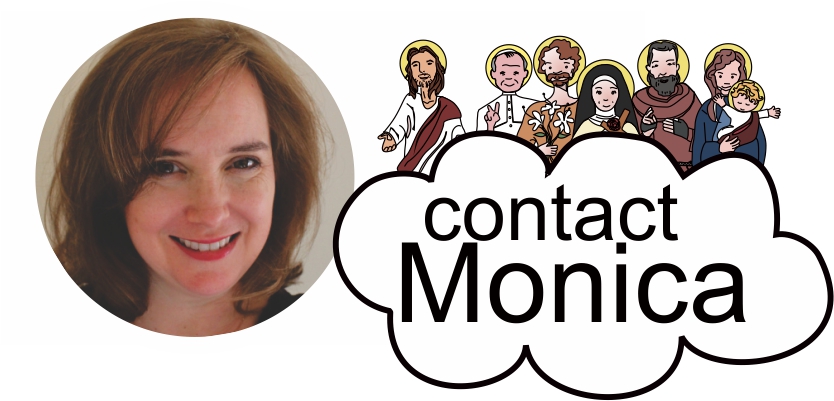


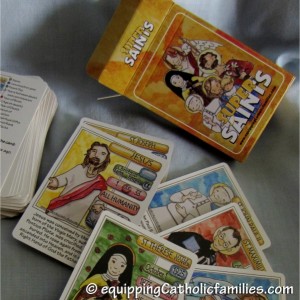












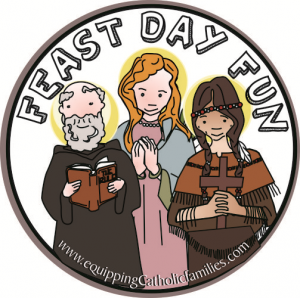











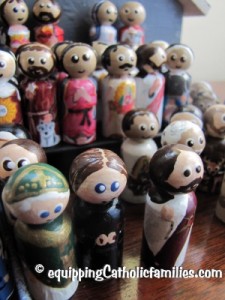
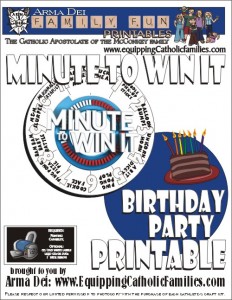





THE APOCRYPHA, DOES IT BELONG IN THE BIBLE?
The word canon comes from a Greek word that means, “measuring stick.” Over time, the word came to be used metaphorically of books that were “measured” and thereby recognized as being God’s Word. When we talk about the “canon of Scripture” today, we are referring to all the biblical books that collectively constitute God’s Word.
Problem: Roman Catholics argue that the apocryphal books, seven books and four parts of books of doubtful authenticity and authority [The Roman Catholic Apocrypha consists of: Tobit, Judith, the Additions to Ester, the Additions to Daniel (Prayer of Azariah and the Three Young Men, Susanna, and Bel and the Dragon), the Wisdom of Solomon, Ecclesiasticus (also called Sirach), Baruch (also called 1 Baruch), the Letter of Jeremiah, 1 Maccabees, and 2 Maccabees.] belong in the cannon. Note that while Protestants call these books “the Apocrypha,” Roman Catholics actually refer to them as deuterocanonical (literally, “second canon”). This so-called “second canon,” however, does not have secondary status among Roman Catholics.
The Roman Catholic Church decided these apocryphal books belong in the Bible sometime following the Protestant Reformation. Martin Luther had criticized the Roman Catholic Church for not having scriptural support for such doctrines as praying for the dead. By canonizing the Apocrypha, which offers support for praying for the dead in 2 Maccabees 12:45,46, the Catholics then had “scriptural” support for this and other distinctively Catholic doctrines.
Solution: Unlike the New Testament books, which claimed to be inspired (2 Timothy 3:16; 2 Peter 1:21; 2 Peter 3:16), the apocryphal books never make that claim. No apocryphal book was written by a true prophet or apostle of God. And no apocryphal book was confirmed by divine miracles. No apocryphal book contains predictive prophecy, which would have served to confirm divine inspiration. [Geisler and MacKenzie, Roman Catholics and Evangelicals, p. 162.]
It is fact that no New Testament writer quoted from any of the apocryphal books as holy Scripture or gave them the slightest authority as inspired books. Jesus and the disciples virtually ignored these books.
Questions:
What does it say to you that not a single apocryphal book claims to have been
Inspired by God?
If the apocryphal books are inspired, why weren’t the writers of these books confirmed by divine miracles like the Old and New Testament writers?
If the apocryphal books are inspired, why didn’t they contain predictive prophecy like the Old and New Testament books?
What does it suggest to you that the New Testament writers often quoted from the Old Testament, but never quoted from an apocryphal book?
In view of the fact that the New Testament writers virtually ignored the Apocrypha, do you think they viewed it as Scripture?
Many church fathers, notably Origin, Jerome, Athanasius, and Cyril of Jerusalem, denied the Apocrypha’s inspiration and canonicity. The early Jews of Palestine, including the Jewish Council of Jamnia which met in A.D. 90, rejected the Apocrypha as Scripture. Also, Philo, a Jewish teacher who lived in the first century, quoted from virtually every Old Testament canonical book, but never once quoted from the Apocrypha.
There are historical errors in the Apocrypha. John Ankerberg and John Weldon summarize a few of these:
Tobit contains certain historical and geographical errors such as the assumption that
Sennacherib was the son of Shalmaneser (1:15) instead of Sargon II, and that Nineveh
was captured by Nebuchadnezzar and Ahasuerus (14:5) instead of by Nabopolassar
and Cyazares….Judith cannot possible be historical because of the glaring errors it
contains….[In 2 Maccabees] there are also numerous disarrangements and discrepancies
in chronological, historical, and numerical matters in the book, reflecting ignorance or
confusion. [John Ankerberg and John Weldon, Protestants and Catholics:
Do They Now Agree? p.59]
Questions:
Does God make mistakes?
Do books inspired by God contain mistakes?
Did you know that history and archaeology are true friends of the Old and New
Testaments because they verify numerous customs, places, names and events in
Bible times?
Did you know, by contrast, that the apocryphal books contain many historical errors?
What does that tell you regarding whether the Apocrypha is inspired by God?
The Apocrypha contains a number of unbiblical doctrines, such as the doctrine of the mass (2 Maccabees 12:42-45; compare with Hebrews 7:27), the notion that the world was created out of preexistent matter (Wisdom of Solomon; compare with Genesis 1 and Psalm 33:9), the idea that giving alms and other works can make an atonement for sin (Ecclesiasticus [Sirach] 3:3; 3:30; 5:5; 20:28; 35:1-4; 45:16; 45:23; compare with Romans 3:20), the invocation and intercession of the saints (2 Maccabees 15:14; Baruch 3:4; compare with Matthew 6:9), the worship of angels (Tobit 12:12; compare with Colossians 2:18), purgatory and the redemption of souls after death (2 Maccabees 12:42,45; compare with Hebrews 9:27).
Because we know the Old and New Testaments are the Word of God, and because the apocryphal books contain doctrines that contradict the Old and New Testaments, we conclude that the apocryphal books are not the Word of God, because God does not contradict Himself.
TESTS OF CANONICITY
The issue of the Apocrypha relates directly to the question of canonicity. When the church formally recognized what books belonged in the canon, there were five primary tests that were applied:
1. Was the book written or backed by a prophet or apostle of God?
2. Is the book authoritative?
3. Does the book tell the truth about God and doctrine as it is already known by previous revelation?
4. Does the book give evidence of having the power of God?
5. Was the book accepted by the people of God?
Measuring the Apocrypha against these tests shows that the Apocrypha falls far short of the Old and New Testaments. The books were not written by prophets or apostles of God. The books do not ring with the sense of “thus saith the Lord.” The book contradict doctrines revealed in the pages of the Old and New Testaments.
The Holy Spirit of God is truly the divine author of Scripture. Though He used erring humans as penmen, He superintended them as they wrote, keeping them from all error and omission. Scripture has final authority because it is a direct revelation from God and carries the very authority of God Himself (Galatians 1:12). What the Bible says, God says. The Scriptures are the final court of appeal on all doctrinal and moral matters. This is what Protestants call sola scriptura (“Scripture alone”).
Jesus said, “Scripture cannot be broken” (John 10:35). He never said “tradition cannot be broken.” Jesus used Scripture as the final court of appeal in every matter under dispute. To the Sadducees He said, “You are in error because you do not know the Scriptures or the power of God” (Matthew 22:29). He told some Pharisees that they invalidated the Word of God by their tradition which has been handed down (Mark 7:13). Jesus informed them, “Neglecting the commandment of God, you hold to the tradition of men” (Mark 7:8). To the devil, Jesus consistently responded, “It is written…” (Matthew 4:4-10).
Following Jesus’ lead, Scripture alone must be our supreme and final authority.
Questions:
1. Would you please read aloud Mark 7:8 and 7:13, where Jesus is speaking to some Pharisees?
2. What is Jesus’ attitude toward tradition here?
3. Would you please read aloud Colossians 2:8?
4. According to this verse, is it possible for human traditions to lead people astray?
Often you may hear that it was the Roman Catholic Church that gave us the Bible. This simply is not true. The canon of Scripture was being established in the very days that the Bible was being written, before the Roman Catholic Church was even in existence.
The Lord Jesus used the Scriptures as His final court of appeal. As noted above, Jesus said, “Scripture cannot be broken” (John 10:35). To the devil, Jesus consistently responded, “It is written…” (Matthew 4:4-10). Jesus affirmed the Bible’s divine inspiration (Matthew 22:43), its indestructibility (Matthew 5:17,18), its infallibility (John 10:35), its final authority (Matthew 4:4,7,10), its historicity (Matthew 12:40; 24:37), its scientific accuracy (Matthew 19:2-5), and its factual inerrancy (John 17:17; Matthew 22:29).